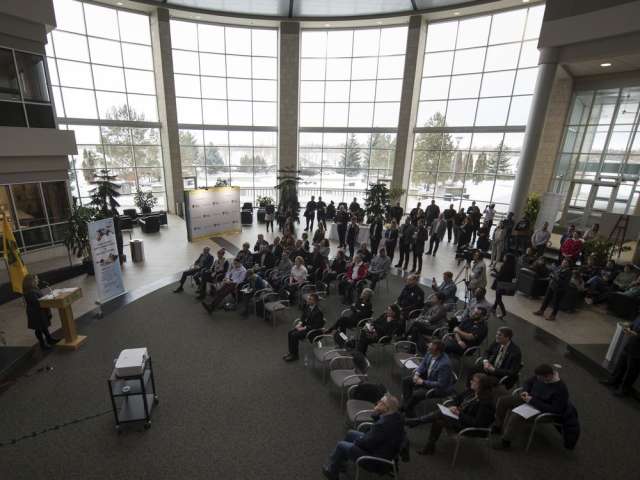
PSPNET praised by Prince Albert peer support contact, former correctional officer
When former correctional officer Michelle McKeaveney’s mental health spiralled into an operational stress injury (OSI) in 2008, online therapy wasn’t an option.
Last Wednesday, however, the U of R released a new online tool for public safety personnel throughout Saskatchewan. Researchers plan to expand it into Quebec, and eventually across Canada.
PSPNET provides free and confidential access to Internet-delivered Cognitive Behavioural Therapy (CBT), among research, definitions of common conditions and referrals to other services.
According to the Canadian Association for Mental Health, CBT is a short-term form of psychotherapy that “focuses on the here-and-now—problems that come up in day-to-day life.”
The program offers guidance on techniques for managing depression, anxiety and post-traumatic injuries through online lessons over eight weeks. Participants also have access to a therapist over text secure messages or phone calls.
It’s led by Heather Hadjistavropoulos. She also founded the Online Therapy Unit in 2010, which offers courses to adults focused on anxiety and depression.
“Through this program, we focus on improving the well-being of public safety personnel such as police officers, career and volunteer firefighters, paramedics, correctional employees, border services personnel, and public-safety communications officials, living with depression, anxiety, and post-traumatic stress injuries,” she said.
For McKeaveney, the website is an “out of a box approach” to accessible resources. Not only is she a former correctional officer, she’s the local contact for a peer support group in Prince Albert.
“The current societal situation kind of indicates that there are more and more frequencies of traumatic events happening or situations that don’t allow for enough downtime to heal,” she said.
“It just becomes the nature of your job and you move through it,” she said, until you reach the culminating event that causes an OSI.

Previously working as a mental health therapist in Fond du Lac, McKeaveney questions how young, new officers cope when they’re posted in remote communities.
“Where do they get resources from? Who supports them?” she asked.
“Now they can just log onto a computer and actually get help while they’re experiencing whatever they’re experiencing.”
McKeaveney said it’s “less threatening” to sit behind a screen rather than admitting what society deems to be weaknesses with someone face-to-face.
“This whole online therapy, telemedicine, is revolutionary.”
Throughout treatment and afterwards, the PSPNET team asks clients to complete questionnaires as part of their research. McKeaveney said first responders are crucial for getting factual responses when it comes to mental health.
“No matter how amazing the research project is, if first responders don’t break our own stigmas and barriers and actually answer the questions, how do these people get factual responses?” she questioned.
“It’s great for us to have the Bell (Let’s) Talk once a year and for people to do those types of things, but this is a 365 day (thing). Operational stress injury doesn’t just go and pick a day out of a year to have an issue, so we need to figure out solutions on the other 364 days.”
“Whether it’s responding to a homicide, a fatal vehicle collision, a suicide, or a dangerous situation, officers encounter a lot on the job that may take a heavy toll on them over a period of time,” added Regina Police Service Cst. Derrick Fox.
Public Safety Canada, through the federal government’s Action Plan on Post-Traumatic Stress Injuries, is supporting PSPNET with $10 million over five years.
A news release said the program—available at www.pspnet.ca—is modelled after one at Macquarie University in Australia.

